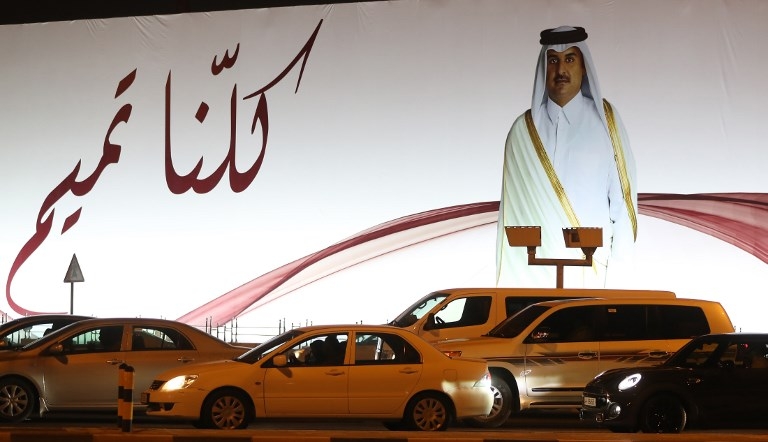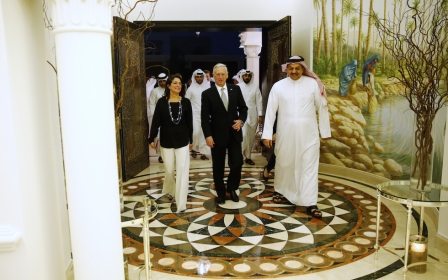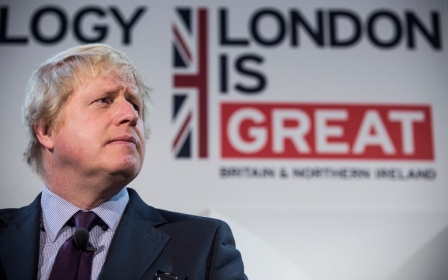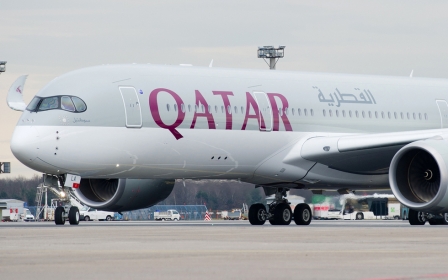Saudi Arabia says Qatar not under 'blockade' and offers aid

Saudi Foreign Minister Adel al-Jubeir insisted on Tuesday that his country has not imposed a "blockade" on Qatar by closing the border and banning Doha's planes from its airspace.
Qatar's border with Saudi Arabia is its only land frontier, and the closure of Saudi, Bahraini and Emirati airspace to Qatar Airways jets has disrupted its normal routes.
But Jubeir, in Washington for talks with US Secretary of State Rex Tillerson - who called last week for the embargo to be "eased" - insisted the move was reasonable.
Saudi Arabia and its Gulf allies accuse Qatar of supporting "terrorism" in the region, something Doha denies, while Doha's supporters - such as Turkey - have warned of a humanitarian crisis.
No blockade?
"There is no blockade of Qatar. Qatar is free to go. The ports are open, the airports are open," Jubeir said, appearing alongside a silent Tillerson.
"What we have done is we have denied them use of our airspace, and this is our sovereign right.
"The limitation on the use of Saudi airspace is only limited to Qatari Airways or Qatari-owned aircraft, not anybody else.
"The seaports of Qatar are open. There is no blockade on them. Qatar can move goods in and out whenever they want. They just cannot use our territorial waters."
Jubeir said the closure of the border has been eased to allow divided families to be reunited, and that Saudi Arabia would send food or medical aid if needed.
Saudi Arabia, the United Arab Emirates, Bahrain and allies abruptly severed all ties with Qatar on 5 June.
Iraqi Prime Minister Haider al-Abadi, due to travel to Riyadh on Wednesday for talks with Saudi King Salman, said on Tuesday that the country opposed the isolation of Qatar, as it is hurting ordinary citizens.
"Regimes are not affected by the blockade; the blockade hurts people," Abadi told reporters in Baghdad.
Abadi said he would seek clarification from Saudi Arabia about the accusations made against Qatar.
US says operations against IS unaffected
The Gulf rift is not affecting US military operations, the chairman of the Joint Chiefs of Staff said on Tuesday.
"We are watching that very, very closely but we have had good cooperation from all the parties to make sure that we can continue to move freely in and out of Qatar," Joseph Dunford told a US Senate Armed Services Committee hearing.
The Pentagon said last week that after Saudi Arabia and its allies imposed economic and diplomatic boycotts on Qatar, current US military operations against the Islamic State (IS) group had not been affected, but it was "hindering" the ability to plan for long-term operations.
On Tuesday, the US Senate voted 53 to 47 to narrowly defeat legislation that sought to block parts of a new, separate arms sale to Saudi Arabia, agreed during a visit there by President Donald Trump in May.
Republican Senator Rand Paul had introduced the resolution – alongside two Democrat senators.
"Today, a bipartisan group of senators took a stand against the escalating war Saudi Arabia is waging with Yemen," Paul said in a statement. "This is just the beginning, and we will continue to take a stance against waging an undeclared war and fueling an arms race in the Middle East."
The State Department said on Tuesday that progress has been made towards resolving the crisis between Qatar and its Gulf neighbours after senior US officials met leading players in the standoff.
"I would characterise the mood and the approach to that as being one that is hopeful, that believes that the worst is behind us," spokeswoman Heather Nauert told reporters.
Meanwhile, Russian President Vladimir Putin and Abu Dhabi's crown prince, Sheikh Mohammed bin Zayed al-Nahyan, discussed the Qatar crisis in a phone call on Tuesday, the Kremlin said in a statement. Both of them called for efforts to resolve the crisis, it added.
New MEE newsletter: Jerusalem Dispatch
Sign up to get the latest insights and analysis on Israel-Palestine, alongside Turkey Unpacked and other MEE newsletters
Middle East Eye delivers independent and unrivalled coverage and analysis of the Middle East, North Africa and beyond. To learn more about republishing this content and the associated fees, please fill out this form. More about MEE can be found here.




